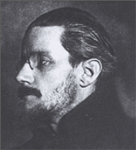The reason for the choice of the title ‘A Little Cloud’ for the eighth story in the collection Dubliners has been a matter of debate among Joyce scholars. Terence Brown supplies the following note: 'Possible allusion to the Biblical tale of Elijah and the prophets of Baal and more particularly to 1 Kings 18;44'.(1) This has not convinced everyone.
Recent commentators however appear to have overlooked a contribution to Modern Language Notes in 1957 which, in drawing a parallel between Joyce’s text and one by another writer, suggests a perhaps more convincing explanation.
Clarice Short notes that this story is the only one in Dubliners which mentions the poet, Byron, who was so admired by the youthful Stephen Dedalus.(2) Little Chandler possesses a volume of Byron’s poems. Short sees similarities between Chandler and the hero of Byron’s verse-tale ‘The Prisoner of Chillon’, which tells the story of Francois Bonivard, a Genovese who in the 1530’s was imprisoned by the Duke of Savoy in the Chateau de Chillon on the shore of Lake Geneva. In Byron’s poem the prisoner is eventually released but during his long imprisonment has grown to love his chains, and he accepts freedom with a sigh.
There are a number of textual parallels. Chandler felt ‘how useless it was to struggle against fortune’ while Byron’s prisoner ‘had not strength to stir, or strive’ (l.223). As Chandler walks down Henrietta Street he picks his way among the children who ‘squatted like mice upon the thresholds.’ Byron’s Bonivard has ‘seen the mice by moonlight play’ (l.383) and has come to relate to them as fellow inmates of the place. After some time alone in the prison, Byron’s hero relates that his environment seemed to him
A sea of stagnant idleness,
Blind, boundless, mute, and motionless! (ll. 249-250)
But then
A light broke in upon my brain,—
It was the carol of a bird (ll. 251-252)
A lovely bird, with azure wings,
And song that said a thousand things,
And seemed to say them all for me! (ll. 268-270)
In the same way, as little Chandler went to meet Gallaher, ‘A light began to tremble on the horizon of his mind.’ But both characters become disillusioned with their visitant from the outside world and are left with nothing but a renewed awareness of their own captive condition.
And when I did descend again,
The darkness of my dim abode
Fell on me as a heavy load (ll. 359-361)
In Chandler’s case ‘A dull resentment against his life awoke within him’ as he contemplates a certain meanness in the furniture of his home. This feeling climaxes with the thought ‘It was useless, useless! He was a prisoner for life.’ As the story closes ‘tears of remorse started to his eyes.’
And then new tears came in my eye,
And I felt troubled and would fain
I had not left my recent chain. (ll. 356-358)
And the state in which Chandler finds himself after the action of the story has ended and Gallaher has returned to London resembles that of the Prisoner of Chillon when he comes to realise that the bird which came to the brink of his dungeon was not, as he had hoped, his brother’s soul returned to help him.
But then at last away it flew,
And then ’twas mortal well I knew,
For he would never thus have flown,
And left me twice so doubly lone,
Lone—as the corse within its shroud,
Lone—as a solitary cloud,
A single cloud on a sunny day (ll. 289-295)
I suggest then that the title ‘A Little Cloud’ is ambiguous in meaning. Little Chandler is that ‘single cloud’ now ‘doubly lone’. But the cloud that has darkened his personal life is also Gallaher's invitation and the way it has changed his attitude to those around him. 'For the first time in his life he felt himself superior to the people he passed.' He gives no thought to the children in the street, who seem to him in his joy to be just 'minute vermin-like life'. In the end he is filled with shame and remorse for having shouted in the face of his own child. But the parallel with Byron's poem suggests that Chandler, like that author’s hero, made friends with those who shared his environment, so much so that he would have accepted the supposed freedom of London, even were it offered him, with reluctance.

